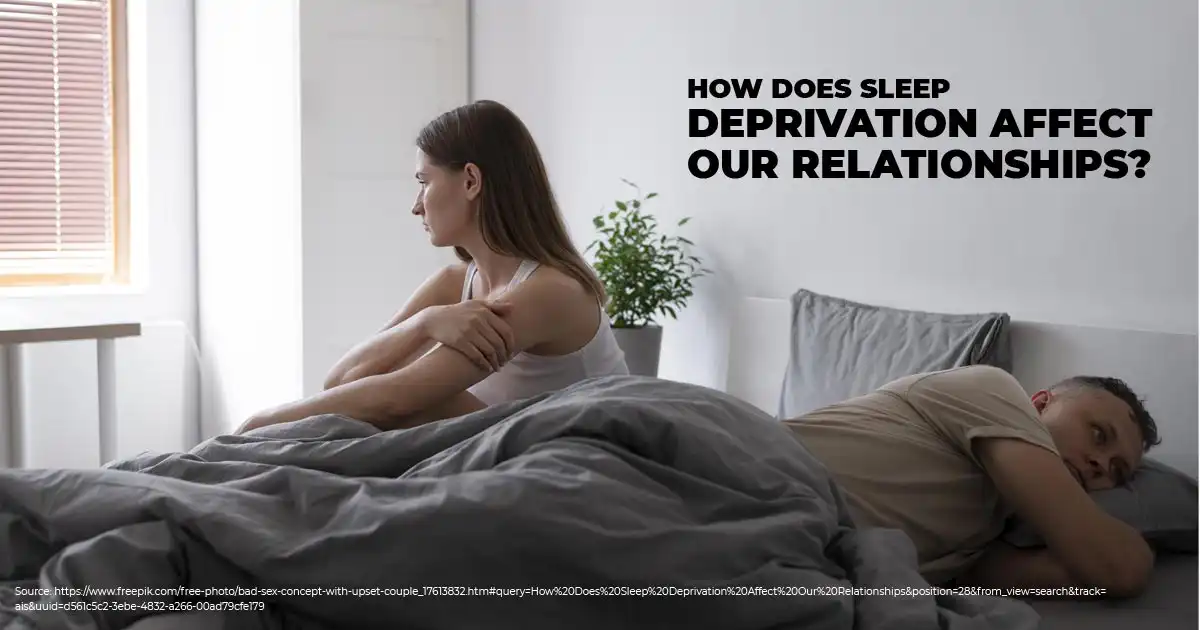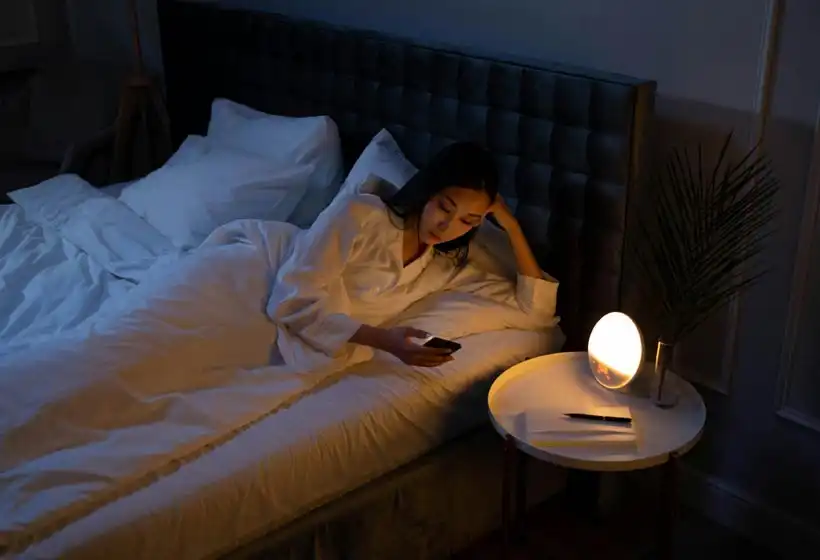NEED TO IMPROVE RELATIONSHIP? SCIENCE TELLS YOU TO SLEEP BETTER!

Ever experienced those sleepless nights when everything just feels off?
If such is the scenario, as a co-sleeper, remember to prioritize your relationships!
In the United States, 39% of people said they have suffered from a sleep disorder. Not getting enough sleep can make us feel off and affect our relationships.
At SmartMattressBuy.com, we’ve got some useful insights about how sleep can make your relationships even better! Let’s talk about how sleep can impact relationships and why getting good sleep can make your connections stronger.
I’ll also share some tips on how to improve your sleep for a happier relationship!
Keep reading!
Bad Sleep Is a Sign of a Bad Relationship
-
How Does Science Explain It?
Effects of Sleep Deprivation on Emotional Reactions
Have you ever felt impatient after a sleepless night? You might just be a bit tired.
When you’re short on sleep, your brain struggles to connect emotions with memories like it normally does.
A study published in the journal of Psychosomatic Medicine has discussed how the part of our brain called amygdala, which deals with emotions, gets affected when we have trouble sleeping. This really affects relationships in a big way.
- Poor Sleep Can Make You Feel Sick and Tired
Centers for Disease Control and Prevention (CDC) states that insufficient sleep can increase your chances of health problems like depression, obesity, diabetes, and heart disease. Lack of sleep can wear you down, especially when you deal with shoulder pain from sleeping.
When you are sick, you may feel pain and numbness in arms and hands while sleeping. At that time, it’s tough to feel happy, and you probably just want to stay in bed. This can affect how you connect with others and your relationships.
- Disrupted Sleep Patterns Can Lead to Relationship Issues
To make sure both of you get enough sleep is crucial in a relationship. Sometimes, couples might feel like they need to sacrifice sleep to spend more time together. If you have an unusual work schedule and you’re in a relationship, finding time to hang out with your loved ones can be tough.
- Poor Sleep Makes You Feel More Alone
Poor sleep can make you feel alone, even if things are good in your relationships. You might feel the same if you sleep next to a co-sleeper.
When we’re tired, it’s tough to connect with others and handle social stuff well. This strain can affect your relationships and make it harder to approach people.
Can Couple Mattresses Help?
Curious if couple mattresses can enhance your sleep?
Selecting the right mattress for both partners is crucial for optimal rest. Sleep on separate beds or invest in bigger King mattresses. Further, factors like firmness options, sleeping positions, and material preferences (foam, innerspring, latex) play vital roles.
Our expert-curated selection caters to your diverse needs, ensuring you and your partner have it all; from motion isolation, responsiveness, to cooling properties, and budget considerations.
No more dilly-dallies! Let’s get to the point!
10 Best Mattresses for Couples!
Here is our list of 10 sleep mattresses for you both to enhance your sleep.
- iSense Hybrid Premier – Best Adjustable Mattress for Couples
- Stearns and Foster Lux Estate – Best Luxury Mattress for Couples
- Casper Snow – Best Cooling Mattress
- Nestbedding Sparrow – Best in Motion Isolation for Couples (Dual-Split option)
- Purple Restore – Best Couples Mattress for Back Sleepers
- Brooklyn Bedding Signature Hybrid – Best Couple Mattress for Combination Sleepers
- Helix Midnight – Best Couple Mattress for Side Sleepers
- Avocado Green – Best Organic Mattress for Couples
- DreamCloud Premier – Best in Value for Couples
- Saatva Latex Hybrid – Best Latex Mattress for Couples (Hypoallergenic)
What Questions Should You Ask Yourself Before Buying a New Mattress?
When a couple is considering purchasing a new mattress, it’s essential to approach the decision-making process thoughtfully.
Q 1. What are my individual sleep preferences and needs?
Consider factors like your preferred sleeping position, firmness level, and any specific requirements based on your body weight or comfort preferences.
Q2. How important is motion isolation and ease of movement for both of us?
Evaluate whether you or your partner tend to move around during sleep and if you prioritize minimal disturbance during nighttime movements or intimate moments.
Q3. What additional attributes are essential for our comfort and satisfaction?
Think about factors like price range, temperature regulation, noise level, and edge support to ensure the chosen mattress meets both partners’ needs.
Q4. Have we discussed our preferences openly and reached a compromise?
Communication is key in selecting a mattress as a couple. Ensure both partners have expressed their preferences and concerns and worked together to find common ground.
Q5. Have we researched and educated ourselves about different mattress types and options available?
Before making a decision, it’s essential to explore various mattress types, read reviews, and understand the features and benefits of each option to make an informed choice tailored to your unique sleep needs.
5 Simple Steps to Buy a Mattress!
Here’s a detailed breakdown of steps to take:
- STEP 1: Discuss with Your Partner
Comfort is subjective, so it’s crucial to have open discussions and involve both partners in the decision-making process. Take advantage of trial periods offered by mattress retailers to ensure the chosen mattress meets both partners’ comfort preferences.
- STEP 2: Understand Key Factors for Couples
Certain factors are particularly crucial for couples when selecting a mattress.
These include:
- Firmness: Finding a mattress with the right level of firmness that satisfies both partners may require compromise. Memory foam, latex, and hybrid mattresses offer varying degrees of firmness and support.
- Ease of Movement/Intimacy: Couples may prioritize a mattress that allows for easy movement during intimate moments.
- Motion Isolation: The ability of the mattress to absorb movement, preventing disturbances when one partner moves.
- STEP 3: Grow Your Knowledge
Lastly, couples can enhance their understanding of mattresses by reading mattress guides and reviews. These resources provide valuable insights into different types of mattresses, sleep preferences, and considerations for couples. By gaining knowledge and exploring various options, couples can make an informed decision that meets their unique sleep needs.
- STEP 4: Identify Individual Needs
Each partner should communicate their specific sleep preferences and requirements. Factors like body weight, sleeping position (side, back, stomach), and desired firmness level vary from person to person. By openly discussing these preferences, couples can better understand each other’s needs and find common ground.
- STEP 5: Additional Attributes to Consider
Beyond the basic preferences, there are several other important factors to take into account:
- Price: Set a budget and explore options within that range, considering discounts and promotions.
- Sleeping Position: Ensure the mattress provides adequate support for each partner’s preferred sleeping position.
- Contouring: Look for a mattress that contours to the body, balancing pressure relief and airflow.
- Quality Materials: Choose mattresses made from durable, high-quality materials to ensure longevity.
- Edge Support: Consider mattresses with strong edge support, especially if one or both partners tend to sleep near the edge.
- Temperature Neutrality: Materials like latex and innerspring coils can help regulate temperature, ensuring a comfortable sleep environment.
- Noise Level: Some mattresses may produce noise when bearing weight or shifting positions. Opt for quieter options, such as latex or all-foam mattresses.
Overall, approaching the mattress-buying process as a couple requires communication, compromise, and thorough research to ensure both partners enjoy restful and comfortable sleep.
Top 5 Reasons: Does Sleep Help Your Relationships?
Educational Benefits of Sleep
Adequate sleep is not just a personal rejuvenation tool; it plays a key role in shaping the dynamics of our relationships. As a self-proclaimed sleep lover, give me a cozy bed, a co-sleeper next to me, and the gentle hum of sleep to music, and I’m in my personal sleep realm.
Our sleep habits can significantly impact our relationships, as sleep is vital for our physical health and productivity. It can also influence the social fabric of our lives.
- Avoid Loneliness:Loneliness and poor sleep share a bidirectional relationship. A study in Nature Communications reveals that after a night of abnormal sleep, individuals not only kept greater social distance but also reported feeling lonelier. The brain’s circuits associated with social repulsion activated strongly, while those linked to understanding others’ intentions diminished.
- Empathy Boosts with Better Sleep:Emotional empathy, crucial for understanding and connecting with others, thrives on quality sleep. Participants who reported better sleep in a study displayed increased empathy toward distressed individuals. Brain scans showed heightened activity in areas associated with emotional empathy, suggesting that good sleep enhances our ability to resonate with others’ emotions.
- Anger Management through Sleep:Sleep plays a pivotal role in anger management. Studies indicate that sleep-restricted individuals become significantly angrier and less adaptable to aversive stimuli. While it’s not confirmed that lack of sleep directly causes aggression, those reporting sleep disturbance tend to exhibit higher levels of aggression.
Improved sleep empowers individuals with better self-control, reducing the likelihood of lashing out even in provoking situations. - Reducing Prejudice: Surprisingly, sleep influences our predisposition towards prejudice. Enhanced willingness to approach others, increased empathy, and better anger control, all associated with quality sleep, contribute to reduced prejudice. Research indicates that a good night’s sleep makes us less likely to stereotype others, fostering more open-minded and accepting social interactions.
- Breaking the Cycle of Sleep and Social Problems:It’s not a one-way street – social issues can disturb our sleep, creating a cyclical relationship. However, consistently prioritizing quality sleep can break this cycle. Establishing healthy sleep habits can positively impact our social interactions, leading to more compassionate connections.
In sleep realm, factors such as co-sleeping or listening to soothing music or using sleep devices like earplugs are additional elements to explore for optimizing rest. Additionally, incorporating meditation to sleep can create a calming atmosphere, enhancing the overall sleep experience.
While questions like “Is it bad to sleep on your stomach?” may vary individually, the overarching message remains clear – prioritizing and maintaining healthy sleep habits contributes not only to personal well-being but also to the richness of our social connections. After all, a well-rested individual is better equipped to navigate the intricacies of relationships.
Insomnia and Relationships

Have you ever considered how a restless night might affect your relationship with your partner?
Insomnia is a typical sleep disorder that makes it difficult for you to fall asleep or remain asleep. It can thereby have a ripple effect on various aspects of life, including our relationships. When we’re tired, we may become irritable, less patient, and more prone to conflict, which can strain the bond with our significant other.
Recent research has shown that sleep deprivation can cause increased anger and decreased relationship satisfaction. This is because a lack of sleep can heighten emotions and reduce our ability to resolve conflicts effectively. In fact, studies suggest that when one partner experiences insomnia, it’s not just their own well-being that suffers – the quality of the relationship can take a hit too.
So, what can be done? Communication is key.
Discussing sleep issues openly with your partner can help both of you understand the challenges and work together towards a solution. This might include establishing a regular sleep routine, creating a comfortable sleep environment, or seeking help from a professional if needed.
Ultimately, tackling insomnia together can not only improve sleep quality but also strengthen the relationship, fostering a deeper understanding and connection between partners. Remember, a good night’s sleep is not just about individual health; it’s about the health of your relationship too.
7 Tips to Combat Insomnia and Improve Relationship
Here’s how you can address insomnia and nurture your relationship:
- Tip 1: Open Communication
Share sleep struggles with your partner for mutual understanding and joint solutions.
- Tip 2: Optimize Sleep Environment
Ensure comfort in your bedroom by upgrading to a larger bed or separate bedding.
- Tip 3: Consistent Sleep Schedule
Maintain regular sleep-wake times to regulate your body clock effectively.
- Tip 4: Limit Screen Exposure
Minimize screen time before bed to enhance sleep quality and relaxation.
- Tip 5: Stress Management
Practice calming techniques like deep breathing or meditation to ease into sleep.
- Tip 6: Regular Exercise
Engage in physical activity for improved sleep onset and depth.
- Tip 7: Professional Support
Consult healthcare experts if insomnia persists for tailored guidance and solutions.
Remember to prioritize quality sleep as in the long term it will benefit both you and your relationship immensely.
What Is ‘Sleep Divorce’?
Have you ever wondered if sleeping separately from your partner could actually improve your relationship?
This concept, known as a ‘sleep divorce’, is gaining traction among couples worldwide. But what exactly does it entail?
Bed Share vs. Sleep Divorce: Why Make the Change?
Sharing a bed is a hallmark of intimacy, but what happens when it starts affecting the quality of your sleep?
We explore the reasons why some couples are choosing to say goodnight from across the hall instead of across the pillow. The notion of a sleep divorce has gained traction, with a significant portion of couples opting to sleep apart.
Celebrities like Cameron Diaz and Carson Daly have shed light on the trend. Reasons vary, from personal preferences to addressing sleep disturbances.
Understanding the individual benefits and drawbacks is key in navigating this shift in sleeping arrangements.
For more insights into sleep and how mattresses play an important role in sleep quality you can check out the experiences of celebrities on mattresses.
Pros and Cons of a Sleep Divorce
While a sleep divorce may sound daunting, many find that the benefits outweigh the drawbacks. From reduced sleep interruptions to improved personal space, we weigh the advantages against potential concerns like decreased intimacy.
Pros of Sleep Divorce
- Improved Sleep Quality: Separating allows each partner to sleep without disturbances, leading to better overall rest.
- Reduced Sleep Disruptions: Eliminates issues like snoring, tossing, turning, or different sleep schedules that disturb sleep.
- Enhanced Relationship: Eliminates potential resentment or frustration from sleep disturbances, fostering a more harmonious relationship during waking hours.
- Personal Space: Provides individual space and freedom to sleep in a way that best suits each partner’s comfort and preferences.
- Health Benefits: Better sleep can lead to improved physical and mental health, reducing the risk of sleep-related health issues.
Cons of Sleep Divorce
- Potential Emotional Distance: Sleeping separately may lead to feelings of emotional distance or loneliness, affecting the intimacy and connection between partners.
- Social Stigma: Society may view sleeping apart as a sign of marital problems, leading to judgment or misunderstanding from others.
- Less Intimacy: Reduced physical closeness can impact intimacy and bonding between partners, both emotionally and physically.
- Communication Issues: Lack of shared bedtime routines and experiences may result in decreased communication and bonding time for couples.
When Is the Right Time to Bring Up a Sleep Divorce?
Timing is everything, especially when it comes to sensitive topics.
We discuss the signs that it might be time to broach the subject of sleeping apart for the sake of better rest.
Signs and Symptoms to Step-up for Sleep Separation
- Persistent Sleep Disturbances: If sharing a bed consistently disrupts your sleep, leading to ongoing exhaustion and fatigue.
- Decreased Quality of Life: When insufficient sleep begins affecting your daily functioning, mood, and overall well-being.
- Increased Risk of Accidents: Frequent sleep interruptions can raise the likelihood of accidents, both on the road and at work.
- Heart Health Concerns: Chronic sleep deprivation is linked to a higher risk of heart problems and cardiovascular issues.
- Weakened Immune System: Poor sleep can compromise your body’s ability to fight off illnesses and infections.
- Weight Gain and Metabolic Issues: Sleep disturbances may contribute to weight gain and a slower metabolism over time.
If these signs persist despite trying other solutions, it may be time to consider a sleep divorce for the sake of your health and well-being.
Before deciding on a sleep divorce, explore alternative solutions.
Alternatives to a Sleep Divorce
Not ready to sleep in separate rooms? Try out these alternative strategies.
There are other ways to address conflicting sleep needs without a full sleep divorce. Discover strategies that can help both partners get a good night’s rest while maintaining closeness.
Before committing to a sleep divorce, consider alternative solutions:
- Screening for Sleep Apnea: If snoring is an issue, screening for sleep apnea may be necessary. Common symptoms include snoring, daytime fatigue, and pauses in breathing during sleep.
- Adjusting Sleep Schedules: Adjust your sleep schedule as per individual chronotype. If conflicting schedules are the problem, try making adjustments to accommodate each other’s preferences. This may involve training oneself to sleep earlier or later.
- Utilizing Sleep Tools: Instead of separate rooms, consider using sleep-promoting tools like earplugs or eye masks to block out disturbances.
- Embracing Scandinavian Style: Opt for Scandinavian-style sleeping, where partners share a bed but use separate bedding. Opt for a dual-split mattress with different firmness level on each side like Nestbedding Sparrow Mattress. Or choose an adjustable bed with smart features like iSense Hybrid Premier with pocketed coiled core and 20 firmness levels. This allows for individual temperature preferences and less disturbance during sleep.
Care to learn about features of Nestbedding Sparrow? Read Review.
Does iSense Mattress capture your interest? Read our detailed Mattress Review for a holistic view.
- Invest in a Suitable Mattress: Investing in a suitable mattress is a key alternative to a sleep divorce. Choosing a mattress tailored to individual preferences like firmness and motion isolation minimizes disturbances, promoting restful sleep without the need for separate beds. This can improve your physical closeness and intimacy while addressing sleep-related issues effectively.
So, as Dr. Brandon Peters, a sleep physician, puts it:
“Prioritizing sleep is really critical for couples. So, whether you choose to share a bed or sleep separately, the goal is to ensure both partners wake up feeling rested and ready to face the day together.”
Social Relationships and Sleep Quality
How Do Our Connections Influence Our Rest?
Can the quality of our social interactions affect how well we sleep at night? It’s a question that has intrigued scientists and people alike.
Research suggests a nuanced connection between relationship dynamics and nightly rest.
Impact of Supportive and Aversive Ties
A study examining the nature of different social relationships found that supportive ties—those filled with understanding, care, and assistance—were positively related to better sleep quality.
- Study findings reveal that supportive relationships, characterized by understanding and care, correlate with better sleep quality.
- Conversely, negative ties marked by conflict predict poorer sleep outcomes, particularly evident in close relationships.
Role of Depression
- Depression acts as a mediator between social interactions and sleep quality.
- Emotional state influences how social interactions impact sleep, underlining the significance of mental health in sleep patterns.
Ambivalence and Indifference: Less Impactful Than Assumed?
- Surprisingly, ambivalent or indifferent relationships have minimal impact on sleep quality.
- Emotional intensity, whether positive or negative, appears pivotal in determining a relationship’s influence on sleep.
Attention on Relationship Quality
- The study highlights the need for a nuanced understanding of relationship types affecting sleep.
- Fostering supportive relationships and managing negative ones could positively impact both waking hours and sleep quality.
Thus scientific evidence underscores the importance of nurturing positive social ties and addressing mental health concerns to promote better sleep and overall well-being.
It emphasizes the intricate interplay between social interactions and sleep, advocating for a holistic approach to health maintenance.
How Might We React When We Are Deprived Of Sleep?
I’ve shared some common symptoms that you will start to face when you are sleep deprived.
Symptoms of Sleep Deprivation
- Cognitive Impairment
- Difficulty concentrating, making decisions, or solving problems.
- Impaired memory and reduced cognitive performance.
- Emotional Instability
- Increased irritability, mood swings, and emotional sensitivity.
- Heightened stress levels and feelings of anxiety or depression.
- Physical Symptoms
- Fatigue, lethargy, and overall weakness.
- Headaches, muscle aches, and general discomfort.
- Impaired Social Functioning
- Difficulty engaging in social interactions and maintaining relationships.
- Feeling withdrawn, self-conscious, or anxious in social situations.
- Decreased Performance
- Reduced productivity and efficiency at work or school.
- Increased risk of accidents and errors due to slowed reaction times.
- Health Risks
- Weakened immune system, making one more susceptible to illnesses.
- Elevated risk of chronic health conditions like obesity, diabetes, and cardiovascular diseases.
- Compensatory Behaviors
- Increased consumption of caffeine or other stimulants to combat fatigue.
- Excessive napping or reliance on sleep aids to catch up on lost sleep.
These reactions to sleep deprivation highlight the profound impact of inadequate sleep on various aspects of physical, emotional, cognitive, and social functioning.
How Can Sleep Affect Your Health?
Here’s how sleep can create a positive impact on your health.
- Overall Well-being
- Sleep impacts nearly every tissue and system in the body, contributing to overall health and functioning.
- Adequate sleep promotes physical, mental, and emotional well-being.
- Physical Health
- Lack of sleep is linked to various health conditions, including obesity, heart disease, diabetes, and infections.
- Quality sleep supports immune function, aids in tissue repair, and regulates hormones related to appetite and metabolism.
- Mental Health
- Sleep plays a crucial role in mood regulation and cognitive function.
- Chronic sleep deprivation is associated with an increased risk of depression, anxiety, and other mental health disorders.
- Cognitive Function
- Sleep is essential for learning, memory consolidation, and problem-solving.
- Inadequate sleep can impair attention, concentration, and decision-making abilities.
- Emotional Regulation
- Quality sleep helps regulate emotions and stress levels, promoting resilience and coping abilities.
- Sleep deprivation can lead to increased irritability, mood swings, and emotional instability.
- Cardiovascular Health
- Poor sleep is linked to an increased risk of hypertension, stroke, and heart disease.
- Adequate sleep supports cardiovascular health by regulating blood pressure and reducing inflammation.
- Immune Function
- Sleep is vital for a healthy immune system, helping the body fight off infections and illnesses.
- Chronic sleep deprivation can weaken immune function, making individuals more susceptible to infections.
- Longevity
- Quality sleep is associated with a longer lifespan and improved overall quality of life.
- Prioritizing sleep hygiene and establishing healthy sleep habits can contribute to longevity and well-being.
How to Improve Your Sleep for a Better Relationship?

In the dance of love and companionship, the choreography of sleep plays a crucial role. After all, who wouldn’t want a happier, healthier, and safer relationship with just a little extra sleep each night?
5 Tips for Better Sleep and Stronger Relationships
- Tip 1: Maintain a Sleep Schedule
The synergy of sleep and love thrives when partners share a sleep schedule. If sleep troubles plague one person, syncing bedtime can make a significant difference. It eliminates disturbances from late-night activities and ensures a peaceful morning routine without waking each other up.
- Tip 2: Increase Light Exposure During The Day
Embrace the sun’s natural glow to optimize your circadian rhythm—the body’s internal clock. Spending time outdoors boosts sunlight exposure, enhancing mood and mental health. Strengthening this connection with nature can contribute to a more harmonious relationship.
- Tip 3: Reduce Blue Light Exposure at Night
Beware the glow of screens in the evening. Blue light disrupts the circadian rhythm, tricking the body into daytime mode. Minimize phone and TV use before bedtime to create a technology-free sanctuary. This intentional screen break also offers quality time for partners to unwind together.
- Tip 4: Consider Sleep-Enhancing Supplements
When sleep eludes you, explore sleep-enhancing supplements like melatonin. Consult your doctor before introducing any new aid, emphasizing a holistic approach to address underlying sleep issues. Rather than relying solely on supplements, focus on understanding and addressing the root causes of sleep challenges.
- Tip 5: Improve Your Sleeping Environment
Your sleep sanctuary deserves attention. Create a comfortable bed, banish distractions, and tailor your environment to suit your preferences. Combat noise with a white noise machine or embrace a sleep mask if light disrupts your rest. Investing in quality bedding or even upgrading to a co-sleeper bed can transform your sleep haven.
As you embark on this journey toward better sleep, remember that the link between sleep and relationships is not just about the sleep hours spent but the quality of those hours. By prioritizing rest, you’re not just investing in your well-being but nurturing the foundation of a strong and vibrant connection with your partner on a co-sleeper bed.
Here’s to nights of blissful rest and days filled with love!
FAQs on Sleep and Relationships
Q1. Should I go to the ER if I haven’t slept in 3 days?
- While sleep deprivation isn’t immediately life-threatening, it heightens risks like heart attack and stroke, necessitating urgent medical attention.
Q2. Is sleeping in the same bed important in a relationship?
- Sharing a bed is a vital health behavior for couples, fostering intimacy and improving sleep quality, especially with customized couple mattresses like iSense Hybrid Premier or Purple Restore.
Q3. What are the 5 stages of sleep deprivation?
- In Stage 1, after 24 hours, symptoms start to appear. During Stage 2 after 36 hours, symptoms intensify. As one progresses to Stage 3, after 48 hours, cognitive impairment worsens. During Stage 4 one stays wake for 72 hours. To make matters worse, in Stage 5 one may remain awake for 96 hours or more.
Q4. What your sleep patterns say about your relationship?
- Sleeping closer indicates a stronger bond, while distant sleeping suggests less intimacy. Spooning signifies relationship closeness, especially during warmer months.
Q5. Do you sleep more when you’re in love?
Oxytocin, released during intimacy, aids quicker sleep onset and longer duration, explaining the drowsiness felt around loved ones.
Q6. How common is it for married couples to sleep in separate bedrooms?
- As per New York Times approximately one in five couples sleep separately, with the practice being more prevalent than commonly assumed.
References
- Ann, A.R. and Natalie, S., 2015. Electrophysiological Assessment of Attention Bias in Good vs. Poor Sleepers.
Link: https://philpapers.org/rec/RUTEAO
- Hale, L., 2010. Sleep as a mechanism through which social relationships affect health. Sleep, 33(7), pp.862-863.
Link: https://academic.oup.com/sleep/article/33/7/862/2454501?login=false
- Ailshire, J.A. and Burgard, S.A., 2012. Family relationships and troubled sleep among US adults: examining the influences of contact frequency and relationship quality. Journal of health and social behavior, 53(2), pp.248-262.
Link: https://www.ncbi.nlm.nih.gov/pmc/articles/PMC3674886/
- Vandekerckhove, M. and Wang, Y.L., 2018. Emotion, emotion regulation and sleep: An intimate relationship. AIMS neuroscience, 5(1), p.1.
Link: https://www.ncbi.nlm.nih.gov/pmc/articles/PMC7181893/
Disclaimer
The details I’ve mentioned are just for general information and shouldn’t replace professional advice. They’re not meant to diagnose sleep or mental health issues. Before any adjustment in your sleep routine, consult a healthcare professional.








